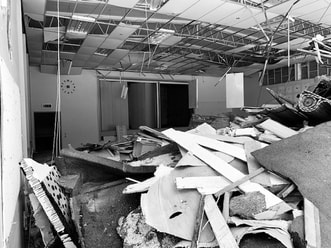 A brief forage into the world of technology and it’s easy to feel daunted by the pace of change. In fact, if you are anything like me you probably feel like change is something that happens around you and your challenge is to simply keep up. A bit like sitting an exam that never quite ends. Futurist Ray Kurzweil wrote in 2001 that every decade our overall rate of progress was doubling but of the current century wrote, “We won’t experience 100 years of progress in the 21st century—it will be more like 20,000 years of progress (at today’s rate).” Now that's a lot of change - but from what we witness it feels closer to truth than fantasy. This is the technological age - we'd just better get used to it. But technology is not the only thing evolving - so are you. Think about it. Are you the same person you were twenty years ago? Of course not. How we think about things has changed - evolved into a new normal, a way of viewing reality that adapts to the environment. Some people protest this - especially, but not exclusively religious people. I think it’s borne out of fear more than anything else. When I was a kid growing up in church some adults in the congregation believed video recorders were the work of the devil. A few years later and the vehicle of the devil was in the hands of the church playing the Cross and the Switchblade to its youth groups. Things change. As do attitudes. I read the profile of Lyndon Bowring recently in Christianity magazine. Lyndon is a statesman within the Evangelical World, a campaigner of note whose contribution has been channelled through the Christian charity CARE which has been his life's work. Now, at the age of 81 he reflects on how he has changed - especially in relation to issues of sexuality. Of abortion he says, ‘But I think it’s compassionate caring that’s going to win hearts more than our campaigning. Thirty-one years ago, I marched through London with a banner that said: “Abortion kills”. I would never do that again.’ Regarding the LGBT community he commented, ‘I think we have changed our attitude. I think we were harsh in those days... somehow, we have got to show them that they are welcome and loved. And certainly, I’m longing to learn how to do that without changing my views.’ He continued, ‘If you are of that point of view, you think of the extremes of homosexuality and promiscuity. But when you encounter people who’ve fallen in love with someone of the same sex, and you remember what it was like to fall in love with someone of the opposite sex.... it’s not so much about sexual activity, it’s about tenderness and kindness towards each other.’ Attitudes change because life is not static. Perceptions are challenged often by new evidence coming to light. If things don't work in the way you were told they would - or should then you can only hold the position for so long before your integrity is compromised. At that point you have to either change or simply drift off into irrelevance wrapped in the shroud of naivety known as self-righteousness. I've found much of this to be true in my own life hence the title - Embrace Your Evolution. We need to recognise that things change - you change, biblical interpretation changes, the way we see and understand the world evolves over time. The concern is if we don’t recognise this you have a higher chance of derailing faith - possibly your own and certainly the faith of those whom you lead and particularly your children. You may consider this to be a terrifying prospect, but the reality of the alternative is already well documented. You can only live consistently with what you believe to be true otherwise you will kill your soul. To thrive you must enable people to handle complexity well. Of holding what might appear to be opposing positions in tension. If you fail to achieve this then you create untenable dilemmas, and I fear my own world of Christian fundamentalism has in many ways served to fuel this. To my mind there are several things that have contributed. Biblical literalism, consumerist Christianity and the explosion of the internet, to name but three have created environments in which Faith has been challenged in ways not experienced in my lifetime, but it’s not only these. We must learn to engage with the world as we find it not as we would like it to be and that means developing faith that is robust, righteous and real. We all display our best side - the superficial aspect of our achievements, possessions, the way we are present in public, but this is not the real you or me. Our lives are lived in the grey areas of doubt and fear. We ponder on mystery, and yet wonder why there is so much suffering the world. Those we love lose jobs they have worked hard for or fail in business; are wrecked by an affair or broken marriage. We pray for those close to us only to see them die. If we don’t pastor well through complexity and pain, then we fail to create enough safe space for people to find redemption in their own brokenness. A robust faith that gives context for suffering and opens the pathway to mystery is what we need. This needs to be reflected in the songs we sing, the sermons we preach and the communities we create. We must do better. In part two of Embrace Your Evolution we will look at the things I consider keys to a developing a faith that provides a pathway to navigate the complexities of the modern age and how we can evolve in our journey. At least these are my thoughts! As usual the comments section is open!
1 Comment
 Consider me sentimental but I always feel sad when something comes to an end. It might be my personality that I feel this way - or the fact I grew up in a stable environment, I’m not sure. I lived in the same house until l left home at 19 and cried when I did. I always feel choked when someone I am close to leaves, and often have to hold back the tears during a moment of change. I’m the guy you don’t want to take to see a sad film! I failed miserably in mastering the art of the stiff British upper lip. For me, change can be unnerving or unsettling – or perhaps both. And yet change is an inevitable part of life – we change, we need to change – and if we don’t embrace it – then change embraces us. We don’t live in a static universe. In truth I have undergone my fair share of change and despite my reservations have worked with it to move on and forward in life. Something of which I was reminded this week with the demolition of the old St Francis Church Complex where we worshipped as a congregation for fifteen years. I remember negotiating the lease to take on the old hall and the long hours of refurbishment to get it fit for purpose. I was inducted into ministry in that place, married Jo there and dedicated our three children – all in that one hall. It has some history for us. I preached at least 40 sermons a year for 15 years there – we go back a long way with Franny’s. And now it’s all gone. Demolition has put an end to what served us well for all that time. That’s why I had to rush and get some photos – perhaps for posterity, maybe for memories and certainly as a record of history. It serves as a reminder that nothing lasts forever. Yet that’s not all, for death is an important part of embracing something new. Would I go back there – no: but being there helped shape what and who we are now. Franny’s is part of the journey, chapters wrapped up in the mystery of what it is to be alive; to have hope and dreams, to work for what we believe in. It’s all rubble now. Broken bricks and twisted steel waiting to be recycled into what will come next. Photos hold our history – capturing memories of how things were, and how over time they pass away. They shaped us those bricks, those steel girders and wooden floors. They are part of us and in the letting go, in the moving on, space is given for something new to emerge. It is part of the circle of life. At a deeper level it serves as a reminder that resurrection lies on the other side of death. ‘Unless a seed falls into the ground it remains a single seed,’ said Jesus. Sometimes we must let go to arrive at a new place. We can all be guilty of holding on too long, of staying put and letting life pass us by rather than learning to seize the moment. There can be sadness in seeing something pass that has existed for a long time – but on the other side of sadness is the opportunity of what is yet to be. |
Author
Archives
December 2022
Categories
All
|
 RSS Feed
RSS Feed
